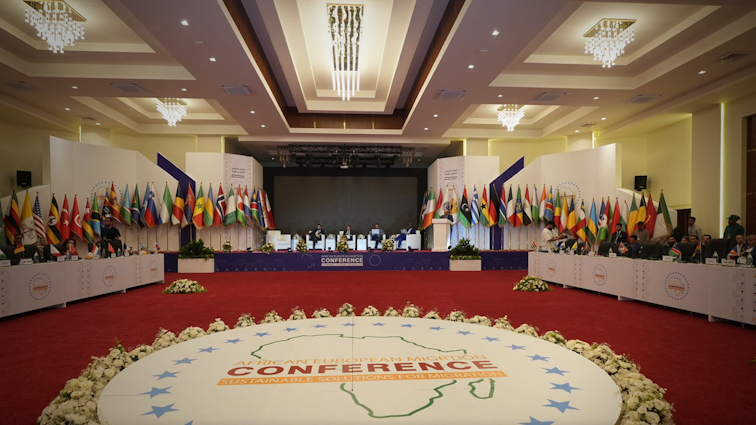The European-African Conference was held in the city of Benghazi in eastern Libya to discuss ways to address irregular migration from Libya to Europe.
The conference, whose sessions began on Saturday, called on the Libyan government appointed by the House of Representatives, in the presence of official delegations from European and African countries.
The government’s Minister of Foreign Affairs, Abdul Hadi Al-Huwaij, announced that the conference aims to bring together various parties from Africa, North Africa, and Europe to find unconventional solutions to address the issue of migration.
Libya has previously witnessed similar international conferences that addressed the issue of illegal immigration, but the crisis is still continuing for several reasons.
Those following the immigration file called for the elimination of the immigration brokerage market spread in most Libyan cities, noting the existence of a thriving trade run by gangs, armed groups, and sometimes official security agencies.
United Nations statistics showed that Libya harbors approximately 704,000 migrants of 43 nationalities, according to data collected from 100 Libyan municipalities in mid-2023.
Last March, the International Organization for Migration announced that the bodies of 65 migrants were found in a mass grave in southwestern Libya.
Osama Hamad, Prime Minister, explained before the conference that sustainable solutions to migration issues require adoption by source, transit and receiving countries, and called for the creation of development programs in source countries to provide a safe and stable life and prevent the option of migration.
Hamad criticized the wrong policies of some receiving countries in intercepting and rescuing migrants, which led to the death of thousands of them at sea.
He stressed the need to establish a European-African entity to monitor labor employment and guarantee the rights of workers through regular migration.
The security services in eastern and western Libya reported the continued presence of human trafficking gangs, leading to widespread migrant smuggling operations.
Tariq Lamloum, a Libyan human rights activist and head of the “Biladi Foundation for Human Rights,” emphasized the increasing activity of armed groups in smuggling migrants, noting the involvement of the majority of parties in these operations.
The national army and security services carried out security campaigns to protect migrants and free them from the grip of gangs, and Hamad called for the establishment of the European-African Migration Observatory to monitor the employment of labor and guarantee the rights of workers.
A Libyan security force reported liberating 107 migrants, including women and children, from captivity in a town in southeastern Libya on May 7.
Walid Al-Arfi, spokesman for the General Department of Criminal Investigation in Benghazi, announced that the migrants were detained for up to 7 months and wanted to immigrate to Europe. Most of them are from Somalia.
The International Organization for Migration announced last weekend that 80,000 irregular migrants had been returned to their countries through the “humanitarian voluntary return system” since 2015.
A Serious assault on a match referee in Libya threatens to close stadiums
